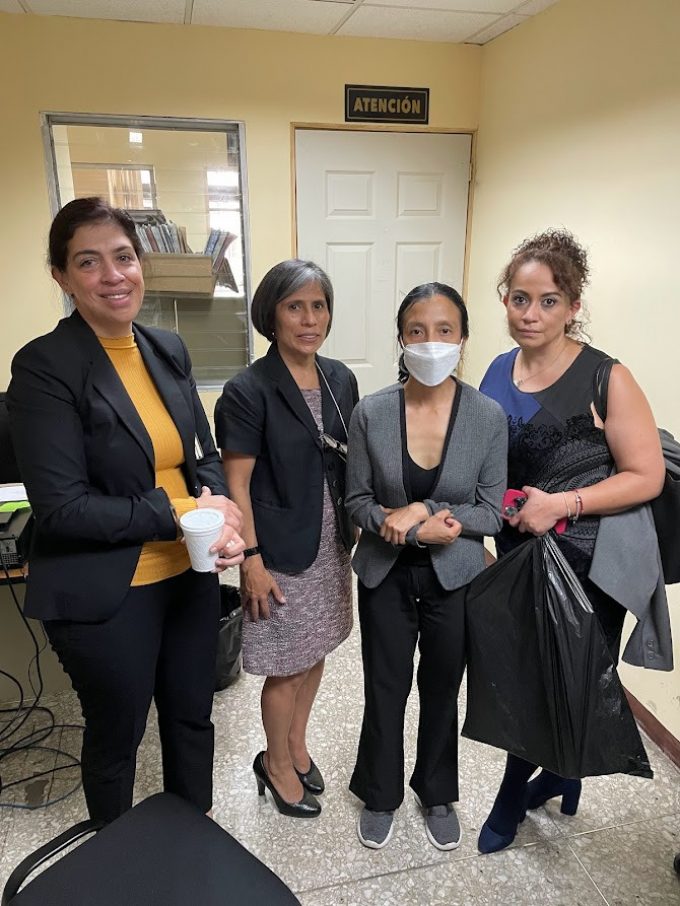Guatemala: Criminalisation and hindrance of former members of the International Commission against Impunity in Guatemala (CICIG) legal practice
13 April 2022
Lawyers Claudia González, Leydi Indira Santizo Rodas and Flor María Gálvez are suffering reprisals for their work as ex-mandataries of the International Commission against Impunity in Guatemala (CICIG)[1] and for defending prosecutors and ex-prosecutors of the Special Prosecutor’s Office against Impunity in Guatemala (FECI)[2].
This risk situation for these lawyers is part of a context of setbacks in the fight against impunity and corruption in Guatemala. The Inter-American Commission on Human Rights has expressed its concern about the judicial persecution of justice operators and former members of CICIG, who are committed to the fight against impunity in cases of serious human rights violations and corruption.
The practice of law involved in these types of cases is being criminalised, with a particular viciousness towards women lawyers who defend other women committed to the defence of human rights and the fight against impunity and corruption in Guatemala. The complaints frequently consist of unfounded accusations that qualify their professional practice as organised crime that obstructs the functioning of justice.
In addition to the risk of criminalisation, women lawyers face serious obstacles when practicing law in these legal proceedings. In particular, they denounce manifest irregularities and arbitrariness in the proceedings: concealment of information and impossibility of access to their clients’ files,inconsistencies and lack of legal argumentation in judicial decisions, which directly violate the right of defence and due process.
Leydi Indira Santizo Rodas, former CICIG lawyer, is currently facing charges of alleged obstruction of justice, having been held in unjustified pre-trial detention for 28 days. According to the information received, the detention stems from defending the case of FECI prosecutor Eva Siomara Sosa Pérez, who is also facing legal proceedings against her.
Lawyer and former CICIG mandatary, Flor María Galvez, has received several criminal charges against her for having assumed the defence of Leydi Indira Santizo and Eva Siomara Sosa. In addition, she has been tried in criminal proceedings for having denounced, together with the prosecutor Virginia Laparra Rivas, acts of corruption against public officials. For fear of being detained, Flor Gálvez was forced to leave the country temporarily. Together with other colleagues, Flor has presented a request for precautionary measures before the IACHR in February 2022, which has not yet been resolved.
Currently, Claudia González, lawyer and former CICIG mandatary, is also defending the case against lawyer Santizo and former prosecutor Sosa, as well as prosecutor Virginia Laparra, who has been remanded in custody since 23 February 2022 for having denounced acts of corruption. In addition to facing the obstacles and arbitrariness of the judicial proceedings she work on Claudia is a victim of stigmatisation through discriminatory and misogynistic attacks on social networks that delegitimise her professional practice as a defence lawyer.
The Observatory strongly condemns the criminalisation of the colleagues and the interference in the legitimate practice of their profession.
The Observatory calls on the Guatemalan authorities to ensure the cessation of all criminalisation and interference in the professional practice of the lawyers.
The Observatory reminds the Guatemalan authorities that the independence of lawyers is one of the main indicators of democratic health and the consolidation of the rule of law. This is in accordance with the provisions of the Basic Principles on the Role of Lawyers (1990), which state:
“Governments shall ensure that lawyers (a) are able to perform all of their professional functions without intimidation, hindrance, harassment or improper interference; (…); (c) shall not suffer, or be threatened with, prosecution or administrative, economic or other sanctions for any action taken in accordance with recognized professional duties, standards and ethics.” (Principle 16).
“Where the security of lawyers is threatened as a result of discharging their functions, they shall be adequately safeguarded by the authorities.” (Principle 17)
“Lawyers shall not be identified with their clients or their clients’ causes as a result of discharging their functions.” (Principle 18)
“Lawyers shall enjoy civil and penal immunity for relevant statements made in good faith in written or oral pleadings or in their professional appearances before a court, tribunal or other legal or administrative authority.” (Principle 20)
“It is the duty of the competent authorities to ensure lawyers access to appropriate information, files and documents in their possession or control in sufficient time to enable lawyers to provide effective legal assistance to their clients. Such access should be provided at the earliest appropriate time.” (Principle 21)
[1] The International Commission Against Impunity in Guatemala (CICIG) was created in 2006 through an agreement signed between the United Nations and the Government of Guatemala, as an independent body with the aim of supporting the Public Prosecutor’s Office and other state institutions in the investigation and dismantling of illegal security forces and clandestine security apparatuses. CICIG was dissolved in 2019 by unilateral decision of former President Jimmy Morales.
[2] The Special Prosecutor’s Office against Impunity (FECI) was created to investigate high-impact corruption cases selected by CICIG and the Public Prosecutor’s Office.

